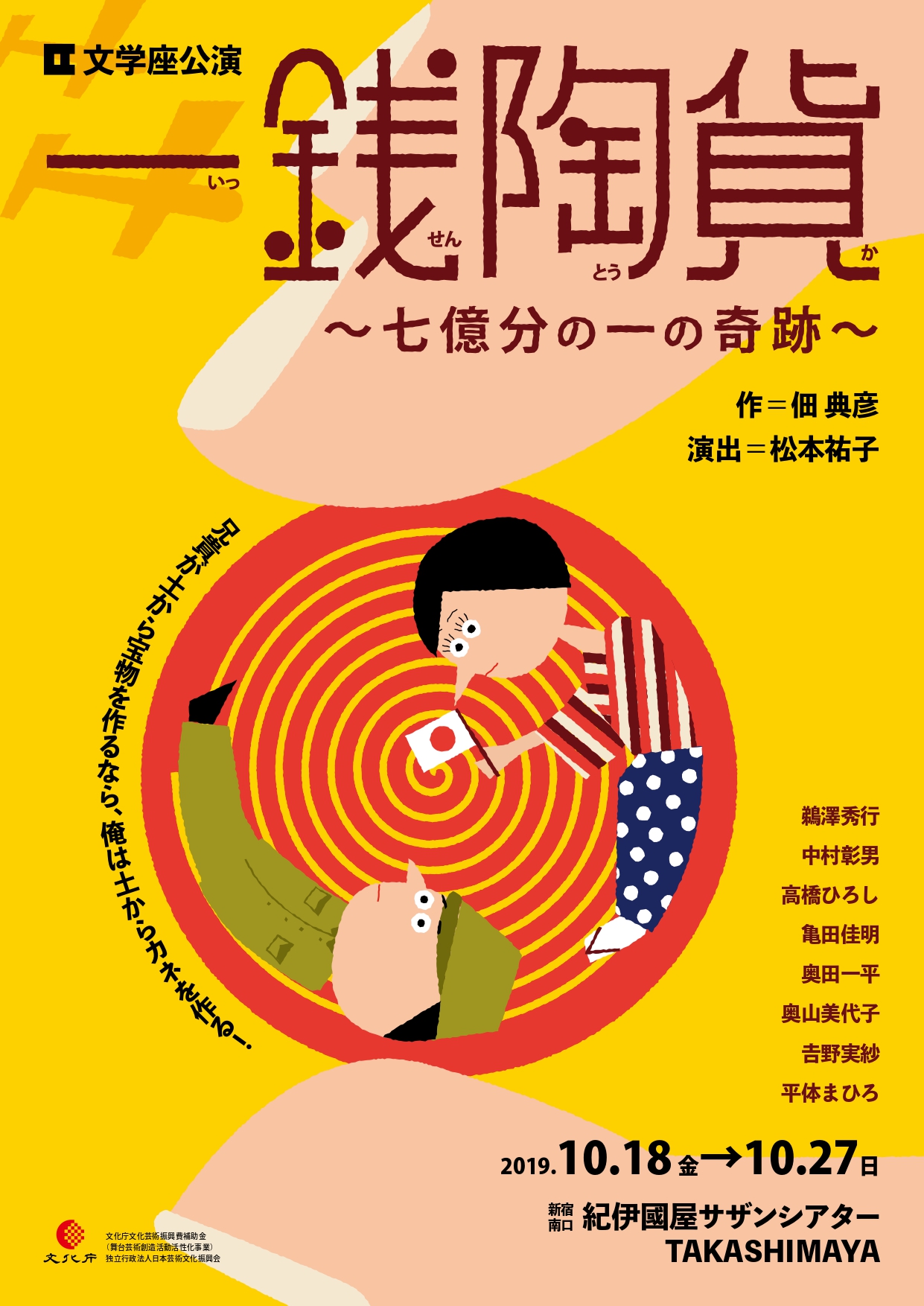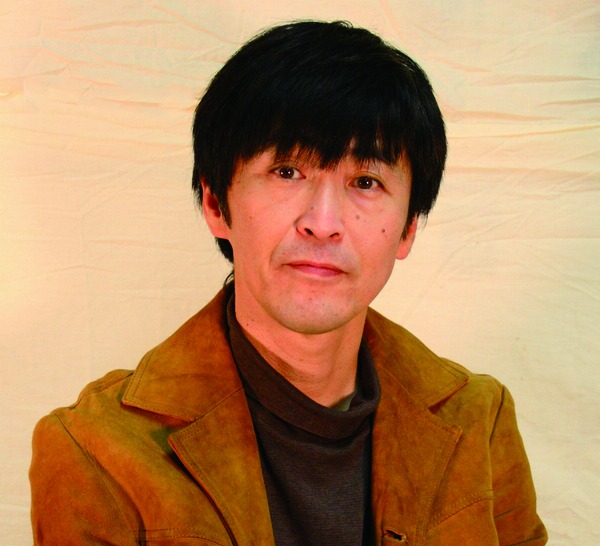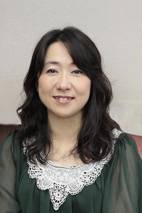
|
TOP>Information>Issen Touka Bungakuza Issen Touka -seven hundred millionth part of a miracle- Written by:TSUKUDA Norihiko Directed by:MATSUMOTO Yuko 2019.10.18.Fri-10.27.Sun KINOKUNIYA Southern Theater TAKASHIMAYA
→ Blog |
The “Issen Touka (one cent ceramic coin)” was made as an urgent measure due to metal shortages
towards the end of WWII, but was never actually used due to a mountain of government red-tape.
Presently, Japanese manufacturing craftsmanship is highly renowned with a catch phrase
“Monodukuri Japan”. In fact, those with advanced techniques and skills have long contributed to the
Japanese economy. This cannot be summed up simply by the aesthetic search for excellence, behind
this swirls a mixture of emotions like greed, jealousy or desire for recognition.
Norihiko Tsukuda, an established writer with a reputation for capturing the humor in daily lives
depicts the foolish but sweet human actions of the people who supported technological advancement
and positive economic effects. The director, Yuko Matsumoto has achieved some outstanding
successes in working with other theater companies including “The Country Girl” (Kenichi Kato
Office) and “PIEGE POUR UN HOMME SEUL” (Haiyuza Theater). For their first collaboration
she worked with Tsukuda on “Nukegara”. For this, Tsukuda received the Kishida Kunio Prize for
Drama, and Matsumoto the Kikuta Kazuo Theater Award.

It’s Seto area in Aichi Prefecture in 1944. The Kato family, a long line of potters, is acknowledged in the town of Seto for their expertise. Yoshio Kato, a first-class ceramic artist used to be so talented as to be called “the red ogre in Seto”, but now he is a mere big drinker and no match at all for his wife Toyo. The couple have two sons. The eldest son, Kazuo is gifted with a talent for pottery and is an A-student at school, but is now off to the war. In contrast, the second son Shouji is crippled because of the childhood accident, and has little talent for pottery. Being exempt from the military service, he is useless being unable to do anything for the country. And there is one more person in the household; Akiyo the family’s housemaid. She is not smart but being positive is her saving grace. As the war worsens, the potters are short of coal, the fuel for the kiln. Some potters in Seto start making ceramic hand grenades instead of their usual products. Toyo holds a grudge against the war due to which her dearest son was taken away and now the work of the Seto ceramists is suffering. Then Inoue from the ceramic company comes to visit the family with some information. The Ministry of Finance has decided to issue ceramic currency instead of metal ones in order to cover the shortage of metal, and has appointed Arita and Seto as the manufacturing regions. Inoue himself, of course, knows how difficult it is to make unbreakable ceramic coins, but came to visit the Kato family to negotiate as he cannot refuse the government. Toyo however strongly opposes the offer saying “Who cares that it’s for the country!?” Yoshio also insists that it would be technically impossible in the first place. Shouji who was listening to the talk disagrees thinking that he would be able to settle the score with his brother if he was successful in this. He tries to release his built-up resentment by concentrating on making ceramic coins, however…

 TSUKUDA Norihiko |
Born in Nagoya, Aichi-pref. in 1964. Playwright, director and actor, Tsukuda graduated from Meijo University. He now heads the B-class Yugekitai Theater Company. He creates stories of the world which are straight and full of lyricism by taking an extremely eccentric situation and adding a touch of laughter. He received a number of awards including the Third Nagoya City Cultural Promotion Award for “Judge . bittersweet is the taste of caramel”, the best play of the Yomiuri Engeki-sho (theater award), and more. Other than writing for the theater, he also writes a lot for the radio and TV drama scenarios. The play, “Nukegara” for which he received the Kishida Kunio Prize for Drama was especially written for the Bungakuza Atelier Showcase.
|

 MATSUMOTO Yuko |
This is the seventh time I have tied up with Mr. Norihiko Tsukuda. Two of those times, Tsukada acted in plays that I was directing. One common element of both his acting and his writing is the way he looks at people as fun and endearing. This time I purposely asked, Tsukuda who is good at irrational taste, to write instead about plain things like the whimsical way of living and the impatient breathing of people who are living their lives. What Tsukada prepared was a story about ceramic coins that were actually made during the war in Seto city in Aichi Prefecture. Even though they do not have the resources they need to make what they want to make, their pride and love of their job helps them attempt the impossible and eventually after many failures achieve something. The catalyst to start them moving was not, “for the good of the country”, but something extremely individual. If anything, it could be said that without individual motives it is unlikely that people would be moved to action. I think that the accumulation of the seemingly absurd challenges of insignificant people made the real history that didn’t make headlines. This challenges surely continue even today. In the shadow of the seemingly bright sounding word, “Monodsukuri Japan” is the harsh reality faced by the artists caused by the priority given to economic growth… I believe this story will act to connect the past and future.
Graduated from the School of Literature (Theater studies major) in Meiji University. |

 UZAWA Hideyuki |
 NAKAMURA Akio |
 TAKAHASHI Hiroshi |
 KAMEDA Yoshiaki |
 OKUDA Ippei |
 OKUYAMA Miyoko |
 YOSHINO Misa |
 HIRATAI Mahiro |
□Staff
Stage setting and arts:SUGIYAMA Itaru Lighting:KAZAWA Ayako
Sound effects:IMANISHI Takumi Costumes:MIYAMOTO Nobuko
Stage Management:OKANO Hiroyuki Assistant Director:MATOHAYA Takaoki
Production Management:SHIRATA Satoshi, TOMOTANI Tatsushi SAISHU Shimako
Graphic Design:CHARHAN Ramone

| 10/18 | 19 | 20 | 21 | 22 | 23 | 24 | 25 | 26 | 27 | |
|---|---|---|---|---|---|---|---|---|---|---|
| Fri | Sat | Sun | Mon | Tue | Wed | Thu | Fri | Sat | Sun | |
| 14:00 | ★ | ● | Reserved Stage | ★ | ● | ● | ● | |||
| 19:00 | 〇 | 〇 | ● |
Latest ticket information⇒Blog
○=Evening discount
★=Post-performance talk
Post-performance talk① 10.19.Sat.14:00
TSUKUDA Norihiko(Playwright)×MATSUMOTO Yuko(Direction)
Post-performance talk② 10.23.Wed.14:00
Casts

Advance ticket sales starts on 2019.9.17.Tue
(all seats are reserved, prices include tax)
◎Adult 6,200yen
◎Evening discount 4,500yen(for October 18th and 21st only)
◎Married couple discount 11,000yen
◎Youth discount 3,800yen (age 25 and under) ※
◎Junior and Senior-high school students 2,500yen ※
※Youth discount tickets require age-verification ID, and junior and senior-high school students need to show their student ID at the entrance.
□Tickets
○BUNGAKUZA Box Office Direct phone number:0120-481034
(10:00~17:30/Monday to Saturday)※Only available in Japanese.
※Please be sure to reserve your tickets first through the BUNGAKUZA Box Office Direct phone number before transferring payments.
This information will also be given to you when you make the ticket reservation.
○Ticket Pia 0570-02-9999 (P-code 496-669)
○e+
○Online Ticket
※How to use→→一銭陶貨

KINOKUNIYA Southern Theater TAKASHIMAYA
〒151-0051 5-24-2 Sendagaya, Shibuya-ku, Tokyo
TAKASHIMAYA-Timessquare South building 7F
TEL:03-5361-3321
8 min. walk from JR Shinjuku Stn. South exit


BUNGAKUZA 03-3351-7265 (Monday to Saturday)
10 Shinanomachi, Shinjuku-ku, Tokyo 160-0016